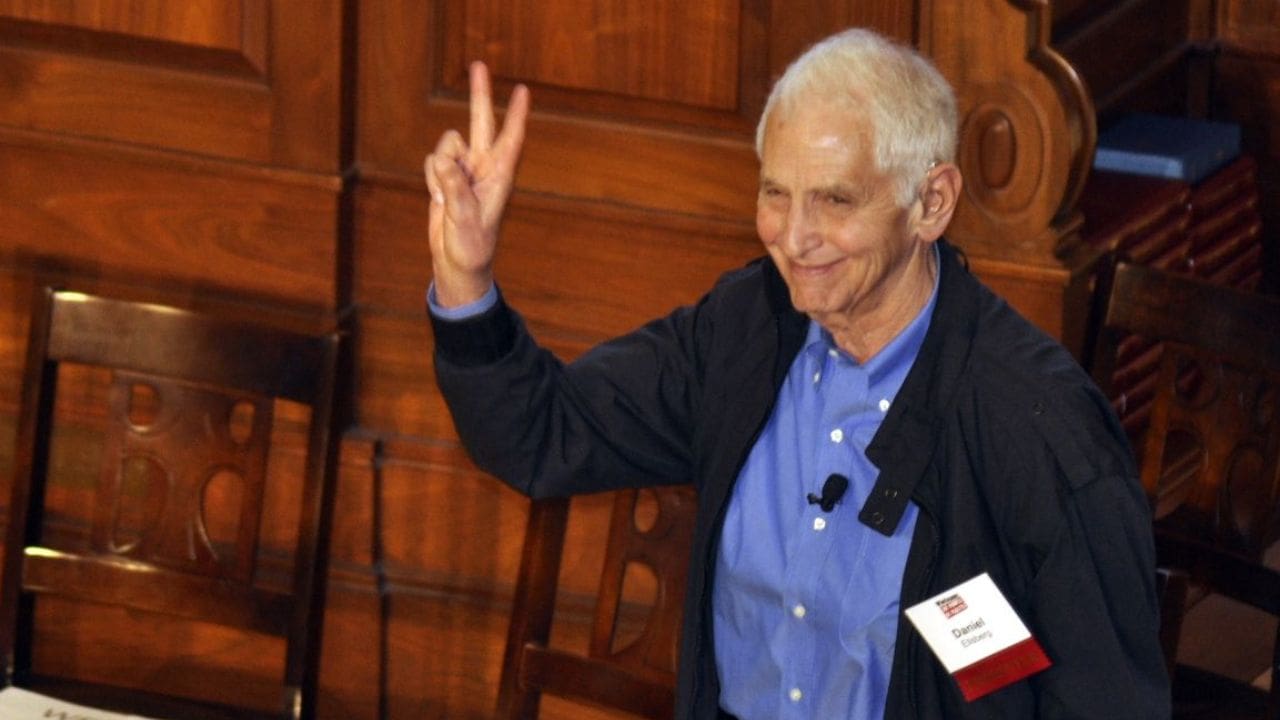One of the most wonderful qualities about Daniel Ellsberg, (1931-2023), is that unlike too many of us he got better and better as he grew older. Maybe we all hope we will — even if we fail to fully meet that goal — but he is a genuine hero in American history who truly got wiser and wiser throughout his long life.
For many years during my working life in Washington, D.C. when I was running an idea salon and representing philanthropist Stewart Mott in a historic building just behind the Capitol between the Supreme Court and the Senate Office buildings, Dan Ellsberg was a frequent visitor to 122 Maryland Avenue. During the 1970’s and ’80’s I would encounter him walking the halls on the first, second and third floors, meeting with Morton Halperin, Admirals Gene laRocque and Gene Carroll and others who were running Fund for Peace Projects which were our tenants in this four-story 1820 building. He was intense, focused and friendly. Everybody around here was engaged in peace efforts, military reform, national security and foreign policy rethinking. It was a veritable hotbed of good ideas for policies to make our country more open, honest, accountable as well as instrumental in getting us to a better world. The US Pentagon’s first famous cost overruns whistleblower, A. Ernest Fitzgerald, another frequent visitor liked to joke that this was the House of Un-American Activities — but it was in fact exactly the opposite.
Dan Ellsberg had not always been an anti-nuclear analyst and advocate. After Harvard (summa cum laude in economics), a stint at Cambridge University in England and a PhD from Harvard, he worked for the US State Department as a nuclear war planner, and went to South Vietnam and then to the RAND Corporation, contributing to a 47-volume study of classified documents on the conduct of the Vietnam War that was completed in 1968.
I was privileged to know two of his associates who influenced his later life. Anthony (Tony) Russo who was also employed by RAND when he worked with Ellsberg to make multiple copies of the Pentagon Papers as that huge 1968 study had come to be known. Randy Kehler, also a member of Citizens for Global Solutions National Advisory Council (CGS NAC), first influenced Ellsberg at a conference in 1969 when he said he was going to prison for draft resistance against the Vietnam War. He said it was the right thing to do. And Ellsberg wrote later that ‘if I hadn’t met Randy Kehler it wouldn’t have occurred to me to copy (the Pentagon Papers).’ Later that year the deed was done. But it was made public by The New York Times in 1971.
Among his several books, his most recent, The Doomsday Machine was first published in 2017. Dan Ellsberg asked me to read it and see what I thought in 2019. A wonderful read! We had a number of deep conversations and that was when I thought he would be a great member of the CGS NAC. He readily agreed. In this last book he discusses the intolerable dangers to the survival of a civilization that nuclear weapons pose if used. In all the years since the end of the Cold War, Ellsberg points out that we still have these Doomsday systems in place. He quotes Martin Luther King observing that ‘There is no such a thing as being too late.’ He also offers a lead quotation from Albert Einstein in 1946 (another former NAC member), ‘The unleashed power of the atom has changed everything save our modes of thinking, and thus we drift toward unparalleled catastrophe.’
Ellsberg was awarded the Ron Ridenhour Inaugural Courage Prize in 2004, among numerous other honors. We were fortunate to have him with us on our CGS National Advisory Council in his last years as he symbolizes a big, influential thinker for our time and our future.
Photo credit: Edward Kimmel from Takoma Park, creativecommons.org/licenses/by-sa/2.0, via Wikimedia Commons


























